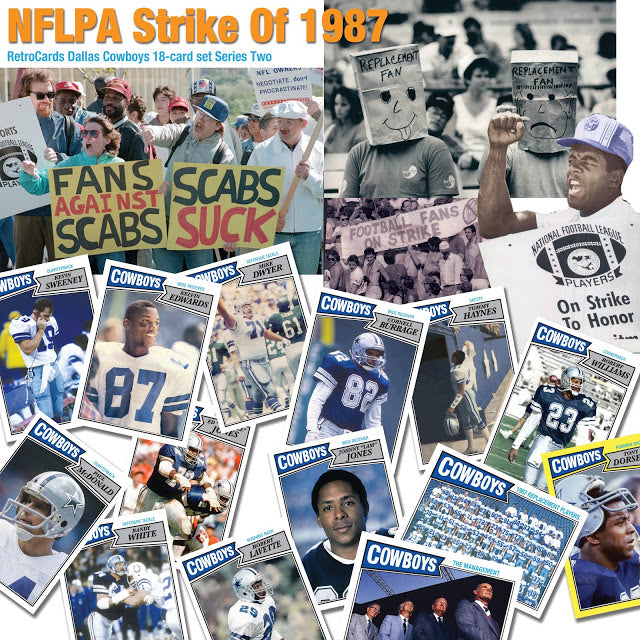
1987 Replacement Cowboys Plus Some History...
In the dying days of the Tom Landry era, the 1987 strike season offered some brief optimism. Some of us thought, “perhaps the Cowboy replacement players can outplay other NFL replacement players and pad their record?” Lord knows the Cowboys needed padding as the strike replacement players actually had a higher winning percentage (2-1) than the regular Cowboy players (5-7). But to be fair, even those strike victories were padded in a rare instance of players crossing the picket line to play in the replacement games. This is were the story gets interesting.
Tex Schramm, never one to pass up an opportunity make/save a buck, forced the hand of several players who had long annuities that Schramm snuck into player contracts in anticipation of the strike. In short, if those players didn’t play, they lose the money. Schramm held this over several players head and players begrudgingly crossed the line rather than lose years of contributions.
Randy White, Tony Dorsett, Ed “Too Tall” Jones were the highest profile players affected by this and crossed the line. Danny White, in an effort to move CBA talks along…… also crossed the line, creating even more team derision. Dorsett begged not to be played in these games but Tom Landry played him anyway. (See part one of 1987 Strike Cowboys here).
The aftermath of the strike was difficult for the Cowboys. Tex Schramm’s level of involvement in the strike earned him the nickname “Commissioner of the Replacement Players,” which made the Cowboys a marked team even after the strike was over. A quarterback controversy developed when Danny White crossed the line and Tom Landry chose to start him over the exciting Kevin Sweeney (a move that almost got Landry fired) , who was having success in the strike games. The opponent was the Philadelphia Eagles coached by All-Pro yahoo Buddy Ryan, who resented Landry using union players against his Eagles. This started a feud by the next game where Ryan ran up the score on the flailing Cowboys.
• The replacement players earned $4,000 a week,
• Cornell Burbage reached into the stands during a road game at New York, grabbed a package and placed it under the bench. It was a box of laundry Burbage’s sister had washed for him.
• In union towns, the replacements were shunned. In places such as Dallas, some fans loved their grit and nicknamed them the “Rhinestone Cowboys.”
• Nearly every replacement team wound up with new fan-given nicknames: The Chicago Spare Bears. The Seattle Sea-Scabs. The New Orleans Saint Elsewheres and the Rhinestone Cowboys.
• New York Jets star defensive end Mark Gastineau, who claimed he needed the money to pay alimony. Gastineau would end up scuffling with a teammate who spat in his face as he crossed the picket line one morning.
• Other stars that crossed the line: Howie Long, Joe Montana, Steve Largent, Lawrence Taylor, Roger Craig, Tony Dorsett, Dwight Clark, Danny White, Randy White
• 37-year-old Jim Zorn, playing in the Canadian Football League, contacted the Seahawks, whom he had QBed for many years, but ended up in Tampa as backup to another 37-year-old, John Reeves, who had started for the Eagles and Bengals in the 70s.
• Sean Payton, future Saints Coach of the Year, played QB for Mike Ditka’s Bears.
• The Bears traded QB Doug Flutie to New England while he was on strike. Doug led his new team to a 21-7 win over Houston during the third week of replacement games.
• Lionel Vital, who ran a grocery store in Louisiana before the strike, became the starting RB for the Redskins.
• The Giants signed 12 players from the semipro Connecticut Giants.
• QB Vince Evans had been out of football since the USFL folded. He started the first replacement game for Oakland despite the fact that former starter Mark Wilson suited up. Vince passed and ran for 311 yards in total offense.
While the strikers lost an average of $15,000 per game (approximately $80 million in salaries altogether), the average owner’s profit per game actually rose from $800,000 before the work stoppage to $921,000 during the strike. However, this gain was wiped out by the fact that the league had to refund $60 million to the networks over the next two seasons for the missed weekend of play, the reduced ratings, and the resulting decline in advertising revenues.
On the day the strike ended, the NFLPA filed an antitrust suit in Federal Court challenging the college draft, restraints on free agency, and other practices alleged to be anti-competitive. (The NBA players had filed a similar suit one month earlier.) The Court of Appeals ultimately rejected the suit on a technicality. NFLPA disbanded, then reformed in 1989 in order to file a new suit that ultimately prevailed at a jury trial. This led to a labor agreement that permitted less restrictive free agency in return for salary caps tied to a formula based on players’ share of total league revenues. So the union, while losing the 1987 battle in the short run, won the war in the long run. This fun set is available now!
On the day the strike ended, the NFLPA filed an antitrust suit in Federal Court challenging the college draft, restraints on free agency, and other practices alleged to be anti-competitive. (The NBA players had filed a similar suit one month earlier.) The Court of Appeals ultimately rejected the suit on a technicality. NFLPA disbanded, then reformed in 1989 in order to file a new suit that ultimately prevailed at a jury trial. This led to a labor agreement that permitted less restrictive free agency in return for salary caps tied to a formula based on players’ share of total league revenues. So the union, while losing the 1987 battle in the short run, won the war in the long run. This fun set is available now!

